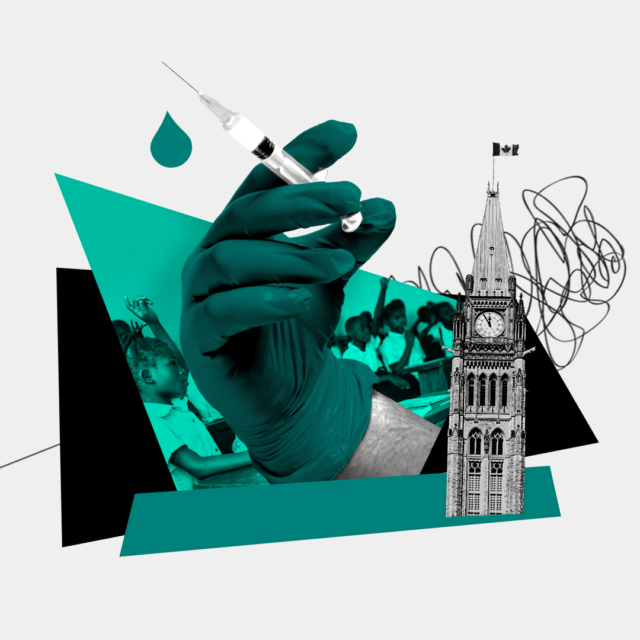After 36 days of campaigning and 16 million votes, the Government of Canada looks essentially identical to the previous one. Now, it is time to get back to work. The world is still facing a significant crisis: the global pandemic.
Despite parliament not changing from when it was dissolved a little over a month ago, we lost five weeks of government action in one critical area: putting an end to the global Covid-19 pandemic.
But there is a key moment tomorrow, for the Government to signal their serious intent to get back to work in a real way. President Biden will host a summit of world leaders, asking them to get behind a set of targets with the ultimate goal of ending the global Covid19 pandemic:
- Vaccinate the world: make sure at least 70% of the population is fully vaccinated in every country a year from now.
- Save lives now by ensuring every country has enough oxygen, PPE, tests and treatments to face potential future Covid waves.
- Build back better by ensuring sustainable financing for health security. We need to be ready for the next pandemic, as dreadful as it is to think about this now.
We don’t yet know if Prime Minister Trudeau will participate (virtually) in this Summit or not, but now that he is re-elected, the world needs him to join the other world leaders and immediately get back to work. Canada must wholeheartedly get behind these targets and put all hands-on deck to achieve them.
A year and a half into this pandemic, with several highly effective vaccines available, only 6% of people on the African continent have received their first shot compared to 75% in Canada (with 70% of Canadians fully vaccinated).
How can Canada contribute to this new initiative? By doing what experts have long been calling for: share, share, and share!
Yes, we sound like a broken record, but that is because the government has not yet risen to the challenge and is failing to adequately respond to this unprecedented moment in history.
Share doses
Canada has so far promised to share a bit over 40 million vaccine doses with COVAX, the global vaccine distribution mechanism, and in a few cases directly with countries. This is a nice gesture, but so far only 1.3 million of these doses have been delivered to countries that need them. Deliveries need to ramp up massively, and rapidly, especially to allow countries a minimum amount of time to put doses in arms before they expire.
We also still have at least 32 million doses excess doses that we risk stockpiling (and potentially wasting) until the end of the year. This is even if 100% of the population (including those under 12, should vaccines be approved for them soon) gets their two shots.
Should we keep all this excess in case we need third shots? So far NACI has only recommended them for immunocompromised people because there is not enough evidence that they are needed for the general population. More than 200 health experts, academics, and medical professionals also wrote a letter to Dr. Tam and PM Trudeau asking them to support the WHO’s call for a moratorium on boosters for low-risk Canadians until more people have been vaccinated around the world.
Medical experts say that we might need boosters at some point in the future — and in fact Canada has specific booster orders in place for the coming years — but right now the priority should be first shots before third shots. That is: giving first doses to people in Africa (especially frontline health workers who still don’t have their dose) and elsewhere who have not yet received it. Canada still expects millions of doses of Pfizer and Moderna to be delivered over the coming weeks.
What will happen with them? Will we leave them in warehouses ‘just in case’ we might need them at some point?
This is a recipe for large-scale waste, an intolerable prospect while the pandemic still rages on in many parts of the world.
Share knowledge
For the past year a group of more than 100 countries, led by India and South Africa, have been pushing for a temporary suspension on intellectual property rights for vaccines and other tools to fight COVID19 at the World Trade Organization (the so-called TRIPS waiver). This would allow developing countries to produce their own vaccines more easily, but several rich countries have been blocking it.
Canada is still officially undecided, but if the government is serious in supporting access to vaccines for all around the world, it should stop effectively stalling the process and support the waiver.
Share resources
This is not a crisis Canada can just cut a cheque to address. The first two “shares” are vitally important, and Canada cannot fulfill the third and ignore the others. So, we cannot celebrate that Canada pledged its fair share until Canada also commits to an immediate dose sharing and knowledge sharing plan.
Yes, Canada has been one of the earliest and biggest financial supporters of the ACT-Accelerator and its vaccine arm, COVAX, one of a few countries that has pledged its fair share of the initial funding target.
We will need to do more. More funding will be needed, not just for vaccines, but for things like PPE, oxygen, tests, and treatments. Until developing countries reach a meaningful share of their population vaccinated, they face the threat of a deadly surge like we saw in India earlier this year, and they need to be prepared and supported.
What is 100% clear is that the crisis is far from over, and that underneath the direct threat of the disease lies huge setbacks in the to fight against extreme poverty. Global food prices are the highest they have been in decades, threatening hunger for millions. 23 million children missed out on routine vaccination in 2020, the highest number in a decade.
This means that the international assistance budget needs to keep up. The past 2 years saw some significant increases because of support for the global Covid response and a strong climate finance pledge. But the Liberal platform only adds $100 million to the International Assistance Envelope (the IAE, the main source for aid) in 2024-25 and 2025-26. If that’s added to the old envelope as it was defined before the pandemic, it would effectively mean a cut to the foreign aid budget. This cannot happen in the current circumstances.
So, we’re back to square one with this new Parliament that looks strikingly like the last.
We know we had to fight hard for development investments in the federal budget.
We know we had to fight hard for the Global Fund to Fight AIDS, TB & Malaria.
We know we still have to fight hard for a truly global plan to address the pandemic crisis.
Let’s be ready for a big fight ahead of the next Budget, and in the mean time, it is time for our Government to get back to work.
On Wednesday, world leaders are coming together for a meeting with President Biden.

